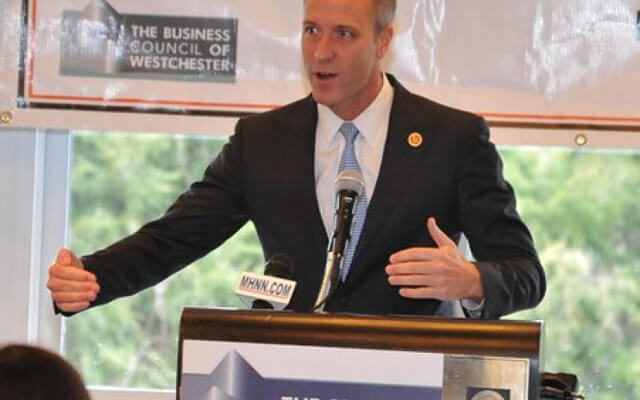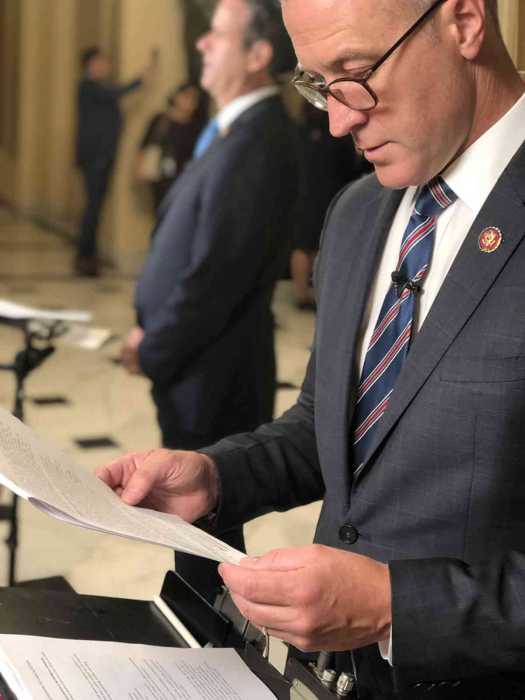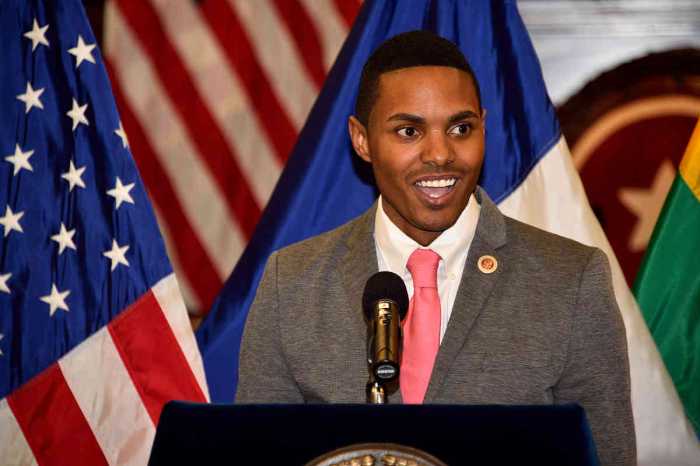Freshman Congressman Sean Patrick Maloney, an out gay Hudson Valley Democrat. | SEANMALONEY.HOUSE.GOV
In the days leading up to the shutdown of the federal government, Congressman Sean Patrick Maloney, an upstate New York Democrat, twice voted to keep the government funded and against overturning Obamacare or delaying its implementation.
But on September 30, in the decisive vote, Maloney, who is gay, was one of nine Democrats who defected, voting with the Republicans on the bill that has essentially left the government without the money needed to keep it running. Its doors have been shuttered ever since.
Since the shutdown, Maloney has sided with the Republicans 11 times, breaking with the Democratic strategy to vote against legislation that would have funded government agencies selectively and incrementally.
And early in the morning of October 1, Maloney was also one of only seven Democrats to vote for a rules change in the House that now prevents anyone but the majority leader — Republican Eric Cantor of Virginia — from forcing a vote on a bill that cannot be reconciled between the Senate and the House, effectively preempting one key Democratic procedural maneuver to end the shutdown.
Gay Hudson Valley House Democrat, narrow victor in 2012, sides with GOP, alienates labor allies
The September 30 GOP-sponsored budget bill, which passed the House by 13 votes, tied funding the government to delaying the implementation of Obamacare for a year. The bill was defeated in the Democratic-controlled Senate. Obamacare health insurance exchanges opened for business the following day, even as the government shut its doors.
In an October 1 press release, Maloney said, “Passing a bill to keep our government running isn’t a game and should not be this controversial, and it’s time for this Congress to get it done. Last night, I did everything I could to prevent a shutdown.”
And in an October 15 interview with Gay City News, he maintained he is a vociferous Obamacare supporter, saying, “I voted not to delay it and not to defund it. Period.”
Many of his past supporters do not share his characterization of his votes.
Indeed, Maloney, who represents Putnam, Orange, and parts of Dutchess and Westchester Counties in the Hudson Valley, has angered many of the progressive organizations that helped him snatch the seat from Republican incumbent Nan Hayworth. In 2014, Maloney will likely face Hayworth again; an Obamacare opponent, she also has the backing of the Tea Party. Maloney, meanwhile, will not have the help of a popular president at the top of the ticket.
Few of Maloney’s critics have been more outspoken than the Working Families Party, the statewide progressive party that backed him in 2012.
“Being a Democrat means something,” said Khan Shoieb, a spokesman for the local WFP Party organization that includes Maloney’s district, “and it’s the wrong moment to abandon progressives. Voting with the Tea Party to shut down the government has consequences.” He said a petition the WFP has circulated criticizing Maloney for his votes has garnered 5,000 signatories.
Maloney, like Dan Maffei, another upstate New York congressman who broke ranks with his party on the key September 30 vote, won his seat in a close race. Maloney’s was decided by only 8,500 votes, with him edging out Hayworth 52 to 48 percent. Because most congressional districts have been gerrymandered to favor one party, victories are generally lopsided, and relatively few districts are competitive every two years. In Maloney’s 18th Congressional District, of about 435,000 registered voters, Democrats outnumber Republicans by roughly 13,000, but there are about 8,500 registered Conservatives and more than 23,000 independents. In such a close race, a few thousand voters who choose to sit it out could be determinative.
Some Maloney supporters remain enthusiastic about his work and his candidacy. The Victory Fund, the national organization that works to elect out LGBT politicians, is sticking with its candidate. “Sean Patrick Maloney is currently endorsed for 2014,” said Jeff Spitko, its spokesman, in a written statement. “We have no plans to reconsider his endorsement, as he currently meets all of our endorsement criteria and was voted upon by the Victory Campaign Board.” The group does not comment directly on policy issues.
But Maloney was elected with strong union support, and the labor base that enthusiastically endorsed him is now expressing strong dissatisfaction, although they stop short of ruling out an endorsement in 2014.
“Rep. Maloney has betrayed his supporters and his constituents by voting with the Tea Party leadership,” said Hector Figueroa, president of 32BJ SEIU, which represents building services workers, in a written statement. “His vote puts him on the side of those who prioritize the right-wing agenda of a minority of politicians over the well-being of the entire country. Not only is he willing to put a knife in the heart of ObamaCare, which allows millions of Americans to access affordable health care, but he is also siding with a leadership that has prevented tens of thousands of Americans from collecting a paycheck, including 32BJ members. With votes like these, Rep. Maloney risks losing the support of those who elected him.”
Other unions are being more diplomatic. “We are disappointed in the Congressman’s vote on this issue, and we wish he had voted differently,” said Carl Korn, a spokesman for the New York State Union of Teachers, which also endorsed Maloney in 2012. “We also recognize he has a strong record of support for issues like education, healthcare, and labor that our members are concerned with.” Korn pointed to several of Maloney’s positions in line with his labor supporters, including the reauthorization of the Elementary and Secondary Education Act, his support of comprehensive immigration reform, and his sponsorship of the Employment Non-Discrimination Act, which would prohibit discrimination against LGBT people in the workplace.
“He has always been with us,” Korn continued. “The vote on October 1 was his first vote against the Affordable Care Act. And there have been multiple votes on defunding the ACA since he's started in the House, but he has never voted to do so.”
Scott Sommer, the New York area regional director of the United Auto Workers, whose organization gave Maloney’s candidacy a boost in 2012, said, “We’re disappointed on some of his votes on the government shutdown. Once this crisis is over, we’ll have a chance to sit down with the congressman and voice our concerns, and hopefully he’ll do things differently next time.”
Two other unions that backed Maloney in 2012 — the New York State AFL-CIO and the Retail, Wholesale and Department Store Union (RWDSU) — declined to comment for this article. The United Food and Commercial Workers Union, which has expressed strong reservations about Obamacare in the past, did not return phone calls.
Asked about dissatisfaction on the part of his union supporters, Maloney said, “I understand that some of my friends in labor disagree with some of my votes in Washington. We won’t all agree all of the time. But on issue after issue I have supported workers and unions.”
Notably absent from the dialogue about Maloney’s recent votes — pro or con — are members of the Democratic Party. Jonathan Jacobson of the Orange County Democratic Committee, declined to comment on Maloney’s votes. No other Democratic politician — local, state, or national — returned phone calls or emails, including members of the Philipstown Democrats (from a town in his district); the Putnam County Democratic Party; the Dutchess County Democratic Committee; Assemblywoman Aileen Gunther, who represents part of Maloney’s district in Albany and endorsed his candidacy in 2012; and House Minority Leader Nancy Pelosi. Silence from supporters in one’s own party is at best unusual.
Despite his firm insistence that he “voted not to delay [Obamacare] and not to defund it. Period,” Maloney in fact voted to put off for a year the law’s individual mandate — which is critical to its viability — explaining that “individuals deserve the same benefits that have been afforded to corporations by the Obama administration,” which has postponed requirements imposed on businesses. He has also cited the widespread website delays that impeded people’s ability to get through to New York State of Health, the state’s newly established health insurance exchange — delays that only became known when the program went live on October 1.
“He sounds like a mouthpiece for the Republican Party — those are their talking points, and their intention is to end Obamacare through, essentially, extortion,” said Kevin Finnegan, a spokesman for 1199 SEIU, the United Healthcare Workers, and a longtime friend and supporter of Maloney. His union is the largest in the state, and Finnegan estimates 10 to 15 thousand members live in Maloney’s district. “When we endorsed, and in fact promoted, Sean,” Finnegan continued, “I thought he had the best chance to beat Nan Hayworth — I still do. But I also thought that he would be a reliable Democratic voice for the area and be with us on important issues like Obamacare.”
As would be expected, criticism of Maloney becomes more pointed the further to the left one moves on the political spectrum. The most scathing attack has come from Community Voices Heard/ Power, a grassroots organization that endorsed and, according to its members, worked hard for Maloney’s election.
Cynthia Gilkeson, a spokeswoman for the group, which works on legislative issues related to welfare and affordable housing in New York City as well as Westchester and Dutchess Counties, said, “I knocked on doors trying to get him get elected, and now I feel betrayed.”
This is not the first time CVH/ Power has tangled with Maloney since his election. They’ve criticized his vote against restoring funding for food stamps in committee (he ultimately voted against the cuts as well as work requirements for recipients.) But they are especially incensed by his vote to further empower Eric Cantor. “Maloney is a Republican in disguise,” Gilkeson continued. “I’m shocked and appalled by his voting record. I can’t distinguish him from Nan Hayworth.”
The Maloney vote on the Cantor rules change may prove the most difficult for him to explain to other Democrats, since it blocks them from trying to use a legislative maneuver to achieve a “clean Continuing Resolution,” free of Tea Party demands, to go to the Senate and the president with to reopen the government. Throughout the crisis, Democrats have said they could attract moderate Republicans in support of such a CR if a free vote were allowed. Maloney said he didn’t think such a strategy would work, given that no Republicans have been willing to date to side with the Democrats.
But that argument contradicts his most recent press release, which links to a Washington Post story reporting that more than 20 Republicans are now prepared to support just such a clean CR. Given Speaker John Boehner’s intransigence on allowing such a vote, however, one critical path to get there is through the House rules that Maloney voted to do away with. The motion to discharge that he now supports, in which a majority of House members petition for a floor vote, is considered a more cumbersome route.
Of the nine Democratic members of Congress who broke with their party on the crucial September 30 vote, seven were elected in very close races. Upstate New York’s Dan Maffei defeated Republican incumbent Ann Marie Buerkle by the same margin of victory Maloney enjoyed, 52 to 48 percent.
Still, more than a dozen Democratic representatives elected in very competitive races chose to vote with their party on September 30, including New York’s Bill Owens, whose rural district spans the state’s North Country, and Tim Bishop, who represents the easternmost part of Suffolk County on Long Island.
After the government shutdown, more and more Democrats, including Owens and Bishop, joined Maloney in voting for bills to fund the government incrementally, including money for the National Institutes of Health, the National Parks Service, the Federal Emergency Management Agency, food stamps. Head Start, border security, the Federal Aviation Administration, and management of nuclear weapons. Each bill passed the House but was rejected by the Senate.
As the country careens toward defaulting on its debt, which, save a compromise bill, Democrats predict could happen on October 18, there are likely to be many more congressional votes, and Sean Maloney’s will continue to be scrutinized intently by his boosters and detractors alike. According to Chris Keeley, CVH/ Power’s political and communications director, his organization did door-to-door outreach in Poughkeepsie and Newburgh, the largest cities in the 18th Congressional District, making more than 20,000 voter contacts in support of his candidacy. As it stands, CVH/ Power seems disinclined to do the same in 2014. In a race that was decided in 2012 by less than 9,000 votes and with union support wavering, such grassroots support could be key.






































